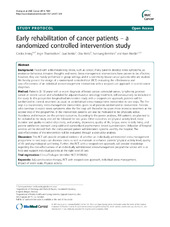| dc.description.abstract | Background: Faced with a life-threatening illness, such as cancer, many patients develop stress symptoms, i.e. avoidance behaviour, intrusive thoughts and worry. Stress management interventions have proven to be effective; however, they are mostly performed in group settings and it is commonly breast cancer patients who are studied. We hereby present the design of a randomized controlled trial (RCT) evaluating the effectiveness and cost-effectiveness of an individual stress-management intervention with a stepped-care approach in several cancer diagnoses. Method: Patients (≥ 18 years) with a recent diagnosis of breast cancer, colorectal cancer, lymphoma, prostate cancer or testicle cancer and scheduled for adjuvant/curative oncology treatment, will consecutively be included in the study. In this prospective longitudinal intervention study with a stepped-care approach, patients will be randomized to control, treatment as usual, or an individual stress-management intervention in two steps. The first step is a low-intensity stress-management intervention, given to all patients randomized to intervention. Patients who continue to report stress symptoms after the first step will thereafter be given more intensive treatment at the second step of the programme. In the intervention patients will also be motivated to be physically active. Avoidance and intrusion are the primary outcomes. According to the power analyses, 300 patients are planned to be included in the study and will be followed for two years. Other outcomes are physical activity level, sleep duration and quality recorded objectively, and anxiety, depression, quality of life, fatigue, stress in daily living, and patient satisfaction assessed using valid and standardized psychometric tested questionnaires. Utilization of hospital services will be derived from the computerized patient administration systems used by the hospital. The cost-effectiveness of the intervention will be evaluated through a cost-utility analysis. Discussion: This RCT will provide empirical evidence of whether an individually administered stress-management programme in two steps can decrease stress as well as maintain or enhance patients’ physical activity level, quality of life and psychological well-being. Further, this RCT, with a stepped-care approach, will provide knowledge regarding the cost-effectiveness of an individually administered stress-management programme whose aim is to help and support individual patients at the right level of care. | en_US |

